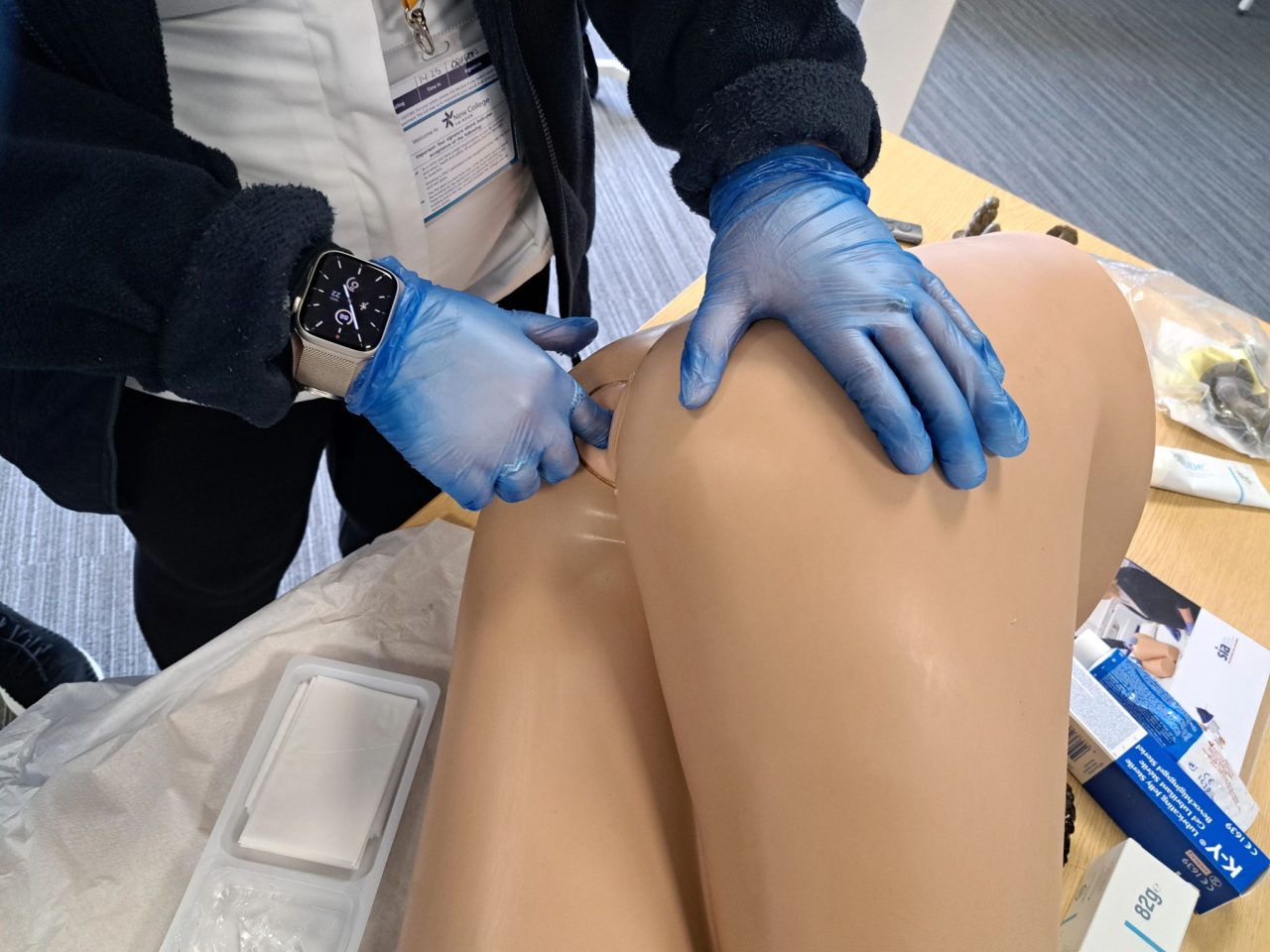
Nurses and carers across the country are being trained in life-saving bowel management techniques using a new and improved rectal examination model, developed by Adam,Rouilly in collaboration with the Spinal Injuries Association (SIA).
The charity provides a range of services to support the estimated 4,400 people who sustained or are diagnosed with a spinal cord injury each year, as well as more than 100,000 already living with such an injury.
One of the most significant changes in the way the body works after a spinal cord injury is the loss of bowel control, both in terms of the sensations that trigger a bowel movement and control of the muscles that prevent it.
Known as neurogenic bowel dysfunction, this condition requires routine care, including the use of suppositories, enemas and the digital (manual) removal of faeces.
If bowel care isn’t properly managed, it can lead to serious complications, such as severe constipation, impacted bowel, and in some cases, the life-threatening condition autonomic dysreflexia.
This is a response to the bladder or bowel being full and can particularly affect those with a T6 level spinal cord injury. It is characterised by a rapid rise in blood pressure, risking cerebral haemorrhage and death.
Some level of bowel care is therefore critical to most patients with a spinal cord injury.
Courses address lack of training and experience.

Despite the level of risk, the NHS identified a lack of staff with training and experience in digital removal of faeces, with limited opportunities for them to learn or practice. This led to the circulation of a Patient Safety Alert in 2018 which required all providers of NHS-funded inpatient and community healthcare services to review training and develop action plans for provision.
As part of their clinical support work, the SIA wanted to develop some training courses to teach all aspects of bowel care to nurses, healthcare staff, carers and family members.
They needed a rectal examination model that could support the training of specific techniques, including the digital removal of faeces.
The original Adam,Rouilly model was developed in partnership with a continence nurse in 1999 and could be used to learn how to perform a rectal examination and assess patient stools in comparison to the Bristol Stool scale, but additional functionality was needed.
Two of the SIA’s specialist clinical nurses, Debbie Green and Carol Adcock, contacted Adam,Rouilly to see if we could help. Our expert term, including Product Developer Daniel Mogentale, worked closely with Debbie and Carol to enhance our rectal examination model, so it could be used to offer this enhanced training to all healthcare professionals and carers.
The model was also redesigned with additional functions to teach suppository insertion, liquid enemas and liquid medication, in response to many customer requests for these features.
The new and improved rectal examination model
The new and improved Rectal Examination, Stool Assessment and Enema Training Model is more versatile and lifelike than ever before and has a variety of extra features.
It is made from a softer, more realistic material and now has four interchangeable rectal inserts. These allow for:
- Stool assessment and general examination
- Stool extraction and manual evacuation
- Identification of abnormalities in the rectal wall and the administration of an enema
- Liquid rectal medications
The enhanced model comes with representations of nine stools from soft to hard, two hard stools for extraction, a flip style Bristol Stool Chart and 13 photographic rectal conditions.
In the 12 months to March 2024, SIA used the model to provide critical training to more than 150 registered nurses, healthcare assistants and personal assistants in 21 training sessions across the country.
Adam,Rouilly Director of Sales & Marketing, Tariq Shahab, said: “Working with subject experts to ensure our products are designed to directly address medical needs and offer the best possible training experience is a core part of the Adam,Rouilly approach, and we were only too happy to collaborate with Spinal Injuries Association.
“The new improved AR421 Rectal Examination, Stool Assessment and Enema Training Model has captured the interest of many education providers around the world.
“We have showcased this model at a combination of simulation, speciality and trade exhibitions globally and customers have commented on the realism, scope and quality of the model, all of which we believe have contributed to its continuing popularity.”
Rectal examination and bowel management is important in a variety of cases, including care of the elderly and treating various conditions which require rectal medication, such as seizures.
Patients with severe Parkinsons Disease, multiple sclerosis, cerebral palsy or spina bifida could also be susceptible to the deadly autonomic dysreflexia, so this enhanced model is helping to fill a critical training and care gap.
Simon Pinnell, SIA’s Business & Enterprise Manager said, “SIA is delighted to have such an excellent relationship with Adam,Rouilly and is proud to have it as one of our Enterprise Partners. By working together, we have been able to increase the bowel management knowledge of hundreds of NHS Staff and other care staff, thus improving the lives of people with a Spinal Cord Injury in a wide variety of care settings, be that NHS Hospitals, Care Homes or in their own homes. We look forward to working together for many years.”